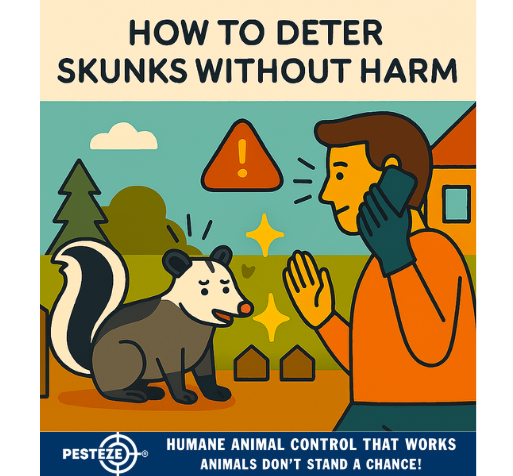HOW TO DETER SKUNKS WITHOUT HARM

HOW TO DETER SKUNKS WITHOUT HARM
SUMMARY
Skunks may be beneficial to ecosystems, but their presence around your home can lead to unpleasant odors, property damage, and pet confrontations. Fortunately, you can deter skunks without causing them harm. This guide outlines humane, effective strategies to keep skunks away from your yard using scent repellents, habitat control, and safe deterrents. With a few proactive steps, you can protect your space while respecting wildlife.
FEATURES
-
Remove Food Sources: Secure trash bins, clean up fallen fruit, and bring pet food indoors at night.
-
Use Scent-Based Repellents: Apply natural deterrents like citrus peels, vinegar, peppermint oil, or predator urine.
-
Install Motion-Activated Devices: Use sprinklers or lights to startle skunks and discourage repeat visits.
-
Seal Entry Points and Dens: Block access to crawl spaces, decks, and sheds where skunks may nest.
-
Maintain a Clean Yard: Trim bushes, mow grass, and remove clutter to eliminate hiding spots.
-
Avoid Harmful Chemicals or Traps: Stick to humane methods and consult wildlife professionals if needed.
GUIDE DESCRIPTION
Skunks are nocturnal foragers that often wander into residential areas in search of food and shelter. While they rarely pose direct threats, their spray defense and digging habits make them unwelcome guests. Deterring skunks without harm requires a combination of scent control, habitat management, and gentle deterrents.
Start by removing food sources. Skunks are opportunistic eaters, drawn to pet food, garbage, birdseed, and fallen fruit. Store trash in sealed bins with locking lids, bring pet dishes indoors at night, and clean up any edible debris from your yard.
Scent-based repellents are highly effective. Skunks dislike strong smells such as citrus, vinegar, ammonia, peppermint oil, and predator urine. Scatter citrus peels, soak rags in vinegar, or use commercial repellents around the perimeter of your property and near potential entry points.
Motion-activated sprinklers and lights can startle skunks and discourage them from returning. These devices are safe and non-invasive, making them ideal for nighttime deterrence.
Inspect your property for potential den sites. Skunks often nest under porches, decks, or sheds. Seal off these areas with hardware cloth or fencing, and avoid blocking active dens until you’re sure the skunks have vacated.
Keep your yard tidy. Overgrown vegetation and clutter provide cover for skunks. Regularly mow your lawn, trim bushes, and remove woodpiles or unused equipment.
Avoid using harmful chemicals, poisons, or traps. These methods can injure skunks or other animals and may violate local wildlife laws. If skunks persist, contact a licensed wildlife control professional for humane removal.
By following these steps, you can deter skunks safely and effectively while maintaining a respectful approach to wildlife management.
- Amy Chang


Comments 0